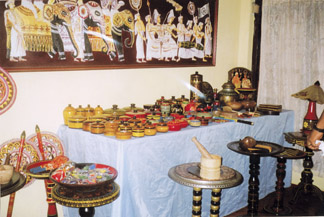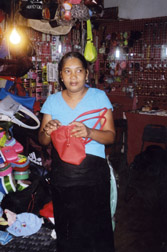|
observer |
|
|
|
|
|
OTHER LINKS |

|

|

|
Making handicrafts a closely guarded secretIt was a rugged terrain that we travelled in Palle-Sapuwita in the Matale district to reach the home of Saman Renuka Wijesiri, a traditional craftsman who had become a successful entrepreneur in recent years. He owes his gratitude to the SEEDS organisation and the European Union (EU) that gave him the impetus to expand his business in a short period of time.
Wijesiri commenced his business on a small scale in the Matale district by churning out handicrafts to a small market segment. Today he sells his products to locals and to foreigners as well. A photograph of Wijesiri receiving the Presidential award from former President D. B. Wijetunga is hung prominently in the drawing room. Wijesiri belongs to a generation of traditional handicraftsmen in Palle-Sapuwita area. His forefathers too had been involved in making handicrafts. The art of making handicrafts, a closely guarded secret among the community had been passed from generation to generation. In the bygone days under royal patronage handicrafts were entrusted to a particular caste. They produced these handicrafts by using old techniques and indigenous raw materials. We found an array of handicrafts such as jewellery boxes, spoons and goblets in his verandah as we walked into Wijesiri's house. They were made of lacquered wood. Wijesiri explains to us the ancient method of adding colour to handicrafts. He said crafts are never painted by hand but instead layers of coloured wax known as "Laksha" is coated before it is scratched by nail or by a pointed object to create multi-coloured designs. "The wax is produced by insects in the jungle region. We collect it and apply on wood after colouring it. This is an age-old industry and one has to have a lot of patience to create different designs by scratching the surface," Wijesiri said. Shantha Jayasuriya, the Project Officer of the Sarvodaya Economic Enterprise Development Services (SEEDS) said that apart from providing credit to entrepreneurs his organisation also provides them entrepreneur development skills and training. The European Union (EU) provides finances for such projects. "Basically we provide marketing, counselling and technology for entrepreneurs", he said. SEEDS project Officer Jayantha Weeragama said after identifying the skills of Wijesiri, they mapped out a scheme to commercialise his products by finding new markets.
Thereafter we arrived in Kandy town to meet another entrepreneur and was enthusiastic to listen to the success story of Shymali Kusumalatha Herath from Polgolla. We visited her small stall in a busy market place in the heart of Kandy town. She earns her living by stitching school bags that have a big demand in the Kandy town. She employs four girls in her village to stitch school bags for her. It was quite interesting to listen to Shymali Kusumalatha's success story. She was forced to find self-employment when her husband met with an accident and was incapacitated in 1994. Although she was knowledgeable in dress making, she had no idea of entrepreneurship or business management. So after joining SEEDS, she followed a CEFE training program in entrepreneurship development and learnt her skills. There was a demand for school bags and hand bags in Kandy so the SEED officers persuaded her to make bags. Soon she ventured into manufacturing school and hand bags and was successful in a short period of time. Shymali said there is a demand for her Teddy Bear school bags during the four school seasons. "The next school season begins in December and I am gearing up for it." She is a seasoned bag maker who commenced business in 1994 with credit facilities extended by the SEEDS. We noticed school children flocking into her tiny shop every now and then to purchase school bags. She moved her business to the heart of Kandy town a few months ago after paying an initial deposit of Rs 15,000 with a rental of Rs 500 daily. Her shop is patronised not only by school children but also by tourists as well. |










